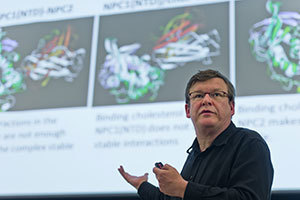 Olaf Wiest presents at the 2013 NPC conference
Olaf Wiest presents at the 2013 NPC conference
More than 70 researchers, patients and families will attend the 2014 Michael, Marcia and Christa Parseghian Conference for Niemann-Pick Type C Research on Thursday-Saturday (June 12-14) at the Jordan Hall of Science at University of Notre Dame. The conference is hosted annually by the College of Science and the Ara Parseghian Medical Research Foundation (APMRF).
Researchers will discuss their progress in Niemann-Pick Type C (NPC) research throughout the three-day conference, which will be broken into six presentation sessions and one poster session. This year’s event has attracted international participants from Chile, Denmark, France, Israel and the United Kingdom, as well as researchers from Columbia University, National Institutes of Health, Scripps Research Institute, Stanford University, Tufts University, Weill Cornell Medical College and many other universities and institutions around the United States.
Niemann-Pick Type C disease is a rare, fatal neurodegenerative disease for which there is currently no cure. NPC primarily strikes children before and during adolescence and affects one in every 150,000 children. The disease causes cholesterol and other lipids to build up in the body’s cells, which results in symptoms such as delayed motor development, deterioration of memory and balance, and seizures. There is no cure for NPC, but research has led to a better understanding of the disease and some promising treatments.
Two Notre Dame researchers and their collaborators have identified histone deacetylase (HDAC) inhibitors as potential therapeutic agents for NPC and have gained approval for clinical trials later this year. Several of this year’s presentations will discuss different aspects of this finding, including the testing of HDAC inhibitors on NPC cell lines and the proof of concept used to get approval for clinical trials. Other presentations will also discuss discoveries of new biomarkers for the disease, new findings in disease progression, and other potential treatments that are currently being studied.
“It is part of the Notre Dame mission to fight for life, dignity and well-being of every person, especially those who are underserved. Our research on NPC and other rare diseases is a very important aspect of our work,” said Greg Crawford, dean of the College of Science. “We are so honored to host NPC researchers, patients and families at Notre Dame every year for the Parseghian conference. Each year we learn about the continued progress that researchers are making around world. This gathering continues to give all of us hope that we are getting closer to a treatment or cure.”
Cindy Parseghian, who lost three children to the devastating disease and founded APMRF with her family, will give remarks at the beginning of the conference. Parseghian and Nadine Hill, executive director of the National Niemann-Pick Disease Foundation, will give a special presentation at the reception on Thursday evening.
“This research conference is an important part of the Notre Dame’s partnership with the Ara Parseghian Medical Research Foundation,” said Rich Taylor, associate vice president of research. “The annual meeting continues to be a wonderful opportunity for researchers in the field to exchange the most recent findings of their understanding of this terrible disease and the most promising leads in the search for a cure.”
The conference is open to the media, but closed to the public. It is made possible through a generous gift to Notre Dame by APMRF, which established the Michael, Marcia and Christa Parseghian Endowment for Excellence to support NPC research and discovery.
Contact: Stephanie Healey, 574-631-5833, shealey1@nd.edu